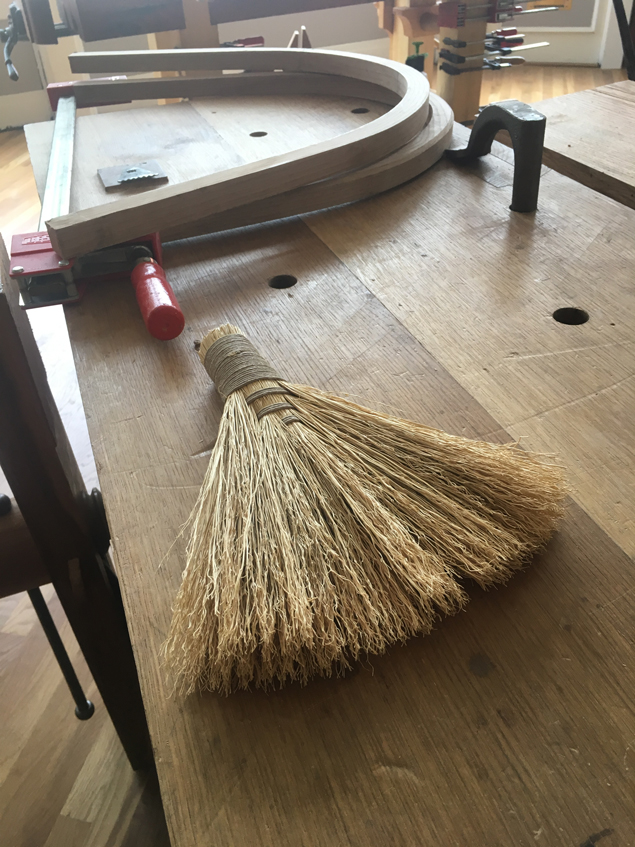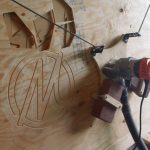We may receive a commission when you use our affiliate links. However, this does not impact our recommendations.
After working with woodworkers all over the world for short periods of time and (in some cases) many years, I can say these four words that might make your woodworking easier: Clean up your crap.
I’m not a natural neatnik, but when it comes to working in the shop, every day ends up with me putting away the tools I’m not in the middle of using and sweeping up the mess. If the garbage truck is due the next day, I also empty the trash cans and chip collector bags.
I do this for a lot of reasons, but one of those reasons isn’t an obsessive-compulsive disorder.
If you read a lot of early accounts of workshop life, one of the first jobs of the apprentice was to sweep the shop, tend the fire and manage the glue. Cleanliness has always been important for busy shops and – in pre-industrial shops – it was a matter of burning down the shop or not burning down the shop.
When I visit the messy shop of a professional woodworker or I work with slovenly students, here’s what always happens: I watch them spend an awful lot of time looking for a wayward block plane, mallet, screwdriver or drill bit.
If you love to play “Where’s Workbench?” then by all means make that a fun part of your hobby or job. But if you would rather always know exactly where your No. 8 countersink bit is, then clean up your act.
When I teach a class, I encourage people to sweep up – and I sweep up a lot myself. And I explain the historical reasons why – I think it’s an important part of learning to be efficient in the shop and making every step a little bit stressful.
And shop cleanliness is the primary reason I hope to never work in a group shop again.
Slobs can thrive in a group shop by letting their mess spill over into the rest of the shop. They’ll borrow someone else’s well-organized tools and not put them back. Or they’ll fill the chip collectors until they are stuffed like a bratwurst.
The people who know how to work with others end up cleaning up after the slob until he gets yelled at or fired.
There’s one more advantage to cleaning up every day: It’s the only time I’ll let my mind wander (instead of being focused on the machine or hand-tool task at hand). And I’ve found that letting my frontal lobe off the leash results in small breakthroughs – whether in design or procedures.
I know there are those who say that slobs or more creative, productive or smarter. But I’ve found that to be 100 percent wrong and await to meet the exception.
— Christopher Schwarz
Here are some supplies and tools we find essential in our everyday work around the shop. We may receive a commission from sales referred by our links; however, we have carefully selected these products for their usefulness and quality.










I’m frequently chided and kidded about my clean shop, with comments like “do you ever do any work here”. Sure, I can make a mess working on a project, but when the Sun slips lower than the tree tops I find a ‘stopping point’ and then clean up. It’s nice to start the next day with the shop clean and organized.
Thank you for this blog. I don’t feel so isolated and unique anymore.
I grew up on a farm and ranched for years after that until age 20. Then I got into aircraft maintenance. There’s no room for sloppy or messy shops in the aviation world. So my habits go way back, and although my shop will get messy while I am actively working on something, I hate to let it get so far as to start losing tools! It doesn’t impress me to see a messy shop.
I can’t really stand Roy Underhill’s shop, although I do watch his show. Not to pick on Roy, but there’s an example of a shop we have all probably seen. He’s always knocking something over or dragging something out from under something else. I couldn’t stand it.
When my wife and I bought our current home, we made a deal. I could use the oversize 2 car garage as a shop as long as she could park the family car in it at night. That makes keeping it relatively clean a necessity. But beyond that, it is necessary to keep all kinds of dust from being tracked inside the house. Is my shop PERFECTLY clean? No, but I try to keep it as close to that as I can out of respect for my wife who fully supports what I do, even to buying me woodworking tools for Christmas. I am blessed.
Well I knew the neatnicks would post and gloat how clean their shops are. You all suk!! I guess I have to come over to the light side and really clean and organize my shop. My shop is a mess, however I know where most of my tools are. My shop time is limited so it will pay off in the long run. Maybe 18′ x 25′ is too much room to handle….
Chris,
I think the primary issue is shop organization or orderliness. At some stages of work, any shop will not be clean but it can always be organized. Later, recovering cleanliness promotes organization. And an organized shop promotes mental clarity, at least for me.
Rob
My workshop is small room in the front of my house that is only 8’x5′. If I don’t keep it clean, I soon find myself with barely any room to move.
That said, a clean shop is definitely more pleasurable to work in than a cluttered mess.
Where’s Workbench?
Man now I have to clean my shop. Thats one thing I like about you, you tell it how you see it.
My shop, which is garage based, is merely a storage area for tools and materials (and two motorcycles). My work space is my driveway. Anytime a project is underway, every workday begins with rolling out one,or both motorcycles so that I can gain access to my tools and materials. At the end of the day, or work period, Things get rolled back into the garage and the shop vac comes out to clean up the mess I’ve created. (On days when I have the dust collector out, I just hook the shop vac hose to it and clean up before it goes away. It’s the last tool in, just ahead of the motorcycles.)
Great point, Chris. I end every shop session with clean up and putting away tools that aren’t pertinent to the next step in the build. Only takes 10-15 minutes. I have found that if I do those steps last, then I get more done in my shop time the next day. I also like to lay out the tools I will need for the next session so I can start wood working instead of tool selecting. Just me.
I agree completely, Chris, and safety is the most important issue here. In addition to that, I find there is (almost) nothing sweeter in woodworking than coming across a situation that requires a particular tool and reaching back to my tool rack and finding it right there, every time. Having to search for it just interrupts the flow and jolts me out of the groove.
Anthony
This is the post I need and not the one I deserve.
So glad to see that woodworking hobbyists have ‘keep it clean’ as a STRONG commonality. Cannot imagine that anybody could stay passionate while digressing from that. You’ve made my day!
Chris & all around – ENJOY every piece of wood & workshop/garage project without ever looking for stuff.
Best Namibian regards from the Kalahari
I had a shop date with a luthier a number of years ago and one of the lessons I learned other than we where not compatible was about keeping things clean incase you make a mistake and knock a chip off that you want to find and glue back in place. I was actually reminded of this last night when I was carving some details and did just that and then looked at the shop floor and knew it was hopeless and wishing I had been keeping things clean.
In our shops (big corporation, to be nameless) they could afford studies. I know, “studies”…..anyway, It was a great place to work so no slurs here. One often quoted was that a dirty shop was a dangerous place to work (with pictures), that dirty shops produced quality that truly sucked (with examples), and that dirt and disorder was a real drag on productivity and morale. In a place where productivity and quality was king and employees were treated like geese that laid the golden eggs, you were required to keep your work place clean and neat and the last half hour of every shift was devoted to cleanup, putting everything back where it belonged, and noting any maintenance needed. The spoken rule was that anyone that thought that this was bulls@@@ would be immediately helped to find gainful employment somewhere else. Did I mention that it was a great place to work?
I clean my shop at the end of the day, I clean while glue is drying, and I clean when I’m stuck on a particular next step. If I use a jack plane to flatten a board or a fret saw to remove waste between 30 dovetails my area is covered with shavings or little triangle of wood that I don’t want to walk on all day long. I clean as I go because it is just part of my habit.
Great post, Chris.
I worked in a shop for several years with 1 and sometime 2 other guys in a very small scale production shop.
We trusted each other’s respect for tools ( even to the point of sharpening them according to the owner’s preferences) and had generally the same attitudes towards cleanliness.
We had some pretty strict rules. We cleaned up our current work areas after each operation. The last half hour of each day was exclusively for cleaning all work surfaces and the floor of the shop, and getting each person’s tools back in their respective tool chests to be ready for the next day.
Fridays extended the cleanup to about an hour and a half, lubricated sometimes by beer as a social event. Everything, including the tops of cabinets, inside of chests, and inside of machines got vacuumed.
And the wild card was that if anybody became uncomfortable with the state of the shop and the distribution of tools, they called out “tool schmool” ( I have no idea what that means, but this was Pennsylvania Dutch country)
And worked stopped until a general cleanup and relocation of tools to each person’s cheats was completed. If a tool was missing,even a nail set, work didn’t continue until it was located.
Certainly the ability to locate tools as needed is an important reason for daily cleanup and improves the efficiency of work. In my mind, though, the more important reason – particularly in a small, home shop – is safety. It is way too easy to literally stumble over clutter and into some very hard and/or sharp metal.
Rick Thomas